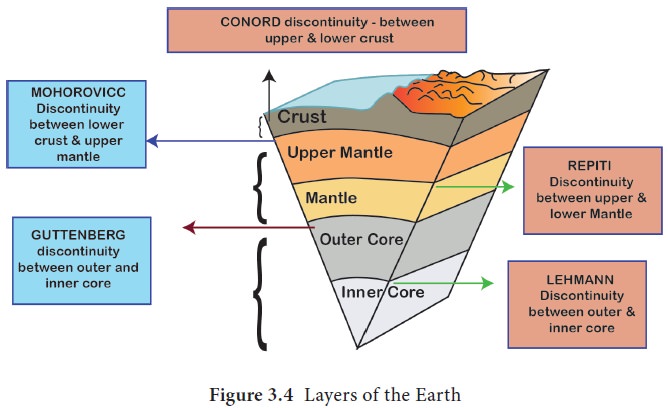Geography - Interior of the Earth | 11th Geography : Chapter 3 : Lithosphere: Endogenic Processes
Chapter: 11th Geography : Chapter 3 : Lithosphere: Endogenic Processes
Interior of the Earth
Interior
of the Earth
The interior of the earth is composed of many
minerals both in the solid and liquid state. The temperature in general
increases at the rate of 1 ° C for every 32 metres towards the earth’s
interior.
Look at the figure.3.4 the layers of the earth.
Earth’s interior can be divided into the crust, upper mantle, lower mantle,
outer core, and inner core.

The Crust
The crust is further divided into upper crust
(continental crust), composed of silica and aluminum (sial) and the lower crust
(oceanic crust) made up of silica and magnesium (sima). The boundary between
the upper crust and the lower crust is termed as ‘Conorod boundary’. The
thickness of the crust varies from oceanic areas to continental areas. Oceanic
crust is thinner when compared to the continental crust. The mean thickness of
oceanic crust is 5 km while the continental crust is around 30 km. The
continental crust is thicker in the areas of major mountain systems. It is as
much as 70 km thick in the Himalayan region. The density of the crust is less
than 2.7 g/cm3.
The mantle
The mantle is composed of silica, magnesium and
iron. It lies between the lower crust and the outer core. It extends for about
2,900 km. It is divided into upper mantle and lower mantle. The mantle generally
is in a solid state. The upper part of the mantle is called asthenosphere. The
word Asthen in Greek means weak. It
extends up to 400 km and it is the main source of magma. The Mohorovicic is the
boundary which divides the lower crust and the upper mantle. The density of the
mantle is 3.9 g/cm3.
The core
The core forms the centre of the earth. Its density
is 13.0 g/cm3. Its temperature is about 5500 ° C to 6000 ° C. The
core has two parts namely the outer core and the inner core. The boundary
between the lower mantle and the outer core is called Guttenberg margin.
The outer core and inner core are separated by Lehmann boundary. The outer core is in
the liquid state while the inner core is in the solid state. Generally, the
core is composed of Nickel and Ferrous (Iron) which is called NiFe
(Barysphere). The core is extended from 2,900 km to 6,370 km from the surface
of the earth.
Related Topics